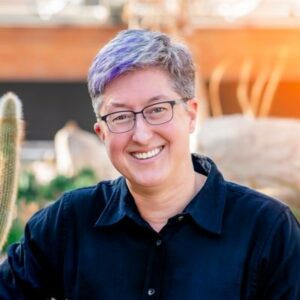Mel Whalen, PhD, LP is an adjunct faculty member supervising students in the MA program this semester.
 Where did you grow up?
Where did you grow up?
For most of my childhood, I lived in Grand Blanc, Michigan, but I spent my last two years of high school in Washington D.C.
What or who influenced you to study psychology?
One of my former therapists, to be honest. I had already gotten a degree in sociology and women’s studies and a master’s degree in linguistics, but I was disillusioned with what I saw in the academic world. I wanted to do something practical that would have a lasting impact on generational trauma. I was seeing a psychologist at the time who was very supportive and empowering, and one day I realized that her job combined all of my prior degrees and interests. I have never regretted my chosen career. The field is constantly changing and opportunities for personal growth are easily available.
What are your research and/or clinical interests?
I work mainly with adults who identify as either neurodivergent, queer, genderfluid or otherwise marginalized within this society. I also see Deaf adults, parents of Deaf children and couples where one member is Deaf. From a research perspective, I am fascinated by the rise of psychedelic assisted psychotherapy, especially for use with populations like Deaf adults where the incidences of attachment trauma are so high. To be clear, these stats are due to the language deprivation and emotional neglect suffered by Deaf children in hearing families that do not learn ASL to create a fully accessible family home, not due to any inherent pathology. I remain eternally hopeful that these statistics will one day improve, but in the meantime, finding new treatment modalities for this form of complex trauma is exciting to me.
What appeals to you most about teaching at MSP?
I think I’ve always been inherently humanistic. I absolutely adored my clinical mentors during my graduate training, but the program as a whole was quite behavioral and I often felt like a bit of a black sheep, on top of already being the only Deaf student. In a tiny community like the Deaf one, it is impossible to hide behind the myth of neutrality. Authenticity and judicious self-disclosure are the only thing that really work, because my clients can easily google me or ask their friends about me, and short of never leaving my house, I cannot avoid dual relationships. When I stumbled into the humanistic world, it felt immediately like home.
What is your favorite non-academic book, and why?
I cannot possibly choose just one.
What advice would you like to share with current students?
Go to your own therapist consistently and do the work, whatever that means for you. Time spent on the other side of the client-therapist relationship will do more to help you both understand your clients and become a better therapist than any amount of academic reading ever will. Don’t fall prey to the constant barrage of work and decide that you don’t have the time. Make the time. It is worth it.